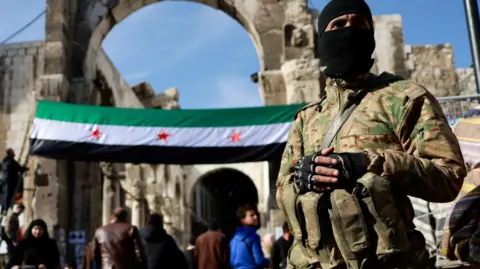Assad loyalists kill 14 in clash with Syria's new ruling forces - authorities
 Getty Images
Getty ImagesSyria's new rebel-led authorities say supporters of ousted President Bashar al-Assad have killed 14 interior ministry troops in an "ambush" in the west of the country.
They say 10 other troops were wounded in the fighting on Tuesday near the Mediterranean port of Tartous, a stronghold of Assad's minority Alawite Muslim sect.
The clashes with pro-Assad loyalists are the first direct challenge to the authority of Syria's de facto leader Ahmad al-Sharaa.
Assad's presidency fell to rebel forces led by al-Sharaa's Islamist Hayat Tahrir al-Sham (HTS) faction just over two weeks ago.
Security forces launched an operation in Tartous province on Thursday, according to state news agency Sana, in a bid to "restore security, stability and civil peace".
Sana reported that the forces had "neutralised... a number of remnants of Assad's militias" in the Tartous countryside, and that it was pursuing others.
Reports say the security forces had earlier been ambushed as they tried to arrest a former officer in connection to his role at the notorious Saydnaya prison, close to the capital, Damascus.
The UK-based monitoring group Syrian Observatory for Human Rights (SOHR) said three "armed men", which it did not identify, were also killed in the clashes.
The SOHR added that the security forces later brought in reinforcements.
On Thursday, it said the former officer, Mohammed Kanjo Hassan, had been arrested together with 20 other people.
The claim has not been independently verified.
In a separate development, the Syrian authorities imposed an overnight curfew into Thursday in the central city of Homs, state media reported.
Reports say this followed unrest over a video purportedly showing an attack on an Alawite shrine.
The interior ministry said the footage was old, dating back to a rebel offensive on Aleppo in late November, and the violence was carried out by unknown groups.
The SOHR said one demonstrator was killed and five wounded in Homs.
The former rebels now in charge of Syria are grappling with the challenge of providing safety and stability across the country.
Syrians are looking to them to protect the rights of people from a variety of backgrounds as well as providing justice for those who lost relatives under the Assad dictatorship.
Demonstrations have also been reported in Alawite-dominated areas including the cities of Tartous and Latakia, and Assad's hometown of Qardaha.
Alawites are an offshoot of Shia Islam to which many of the former regime's political and military elite belonged, including Assad's family.
The Alawite community is fearful of revenge, with members blamed for the torture and killing in Syria under Assad.
Former officers are refusing to hand over weapons and locals in some towns suggest they want to fight back, which appears to have been the case in Tartous.
There have been calls from Alawite religious leaders for a general amnesty for Alawites - but this is unlikely because of the many alleged war crimes conducted by its members.
Although al-Sharaa has bolstered security in Alawite towns and cities in an attempt to maintain order, if his forces do launch a campaign to arrest Assad loyalists, they risk further destabilising an already fragile country.
Tens of thousands of people were tortured to death in prisons in Syria, and thousands of families are still waiting for answers and for justice.
Syrians are calling for those responsible to be held to account - the very thing that members of the Alawite are worried about.
The HTS-led lightning offensive that started from Syria's north-east and spread across the country ended more than 50 years of rule by the Assads.
Assad and his family were forced to flee to Russia.
HTS has since promised to protect the rights and freedoms of many religious and ethnic minorities in Syria.
The group is designated as a terrorist organisation by the UN, the US, the EU, the UK and others.
On Tuesday, protests broke out in the country over the burning of a Christmas tree, prompting fresh calls for the new authorities to protect minorities.
